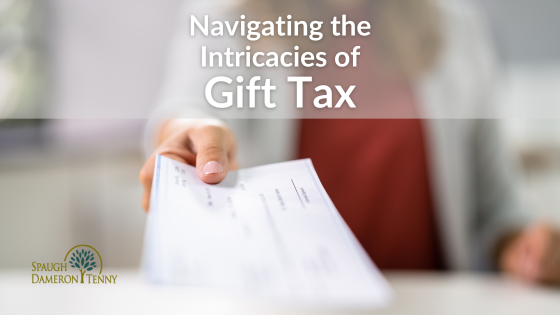The gift tax, a federal tax on the transfer of money or property, can be confusing even for experienced investors and professionals. Understanding the annual gift tax limits, exclusions, and filing rules helps you make informed financial decisions, reduce tax risks, and safeguard your estate for future generations.
Here, we delve into key aspects of the gift tax, including its limits and deductions, as well as practical tips for avoiding unexpected tax obligations.

The federal gift tax applies when one person transfers assets to another without receiving full value in return. The tax is usually paid by the giver (the donor), not the recipient. Gift tax rules are based on two key thresholds:
1. Annual gift tax exclusion – the amount you can give to each person annually without paying taxes.
2. Lifetime (unified) gift and estate tax exemption – the total amount you can transfer during your lifetime and at death without incurring federal gift or estate tax.
Exceeding the annual limit doesn’t automatically mean you owe tax, but it does require reporting on IRS Form 709, which tracks your lifetime exemption usage.
The annual gift tax exclusion for 2025 is $19,000 per recipient and remains the same for 2026.
Example:
If you gift your daughter $25,000 in 2025, the first $19,000 is excluded. The remaining $6,000 must be reported, but it simply counts against your lifetime exemption — no gift tax is due. (Source: IRS “What’s New — Estate and Gift Tax”)
This is the total amount of gifts you can give over your lifetime, or leave in your estate, before you have to pay a gift or estate tax.
| Description | Amount |
| Total gift in 2025 | $40,000 |
| Annual exclusion | $19,000 |
| Taxable portion | $21,000 |
| Lifetime exemption remaining | $13,969,000 |
For instance, if you pay $40,000 for your child's wedding this year, you will use up your $19,000 annual exclusion. The bad news is that you will need to file a gift tax return. However, the positive news is that you probably won't have to pay a gift tax. Why? Because the additional $21,000 ($40,000 - $19,000) simply counts against your lifetime exclusion.
Remember, any gift tax return that you file keeps track of that lifetime exclusion. This means that if you don't gift anything during your life, you have the whole lifetime exclusion to use against your estate when you die.
The lifetime gift and estate tax exemption is increasing significantly in 2026 due to recent legislation.
| Category | 2025 | 2026 |
| Annual gift tax exclusion (per recipient) | $19,000 | $19,000 |
| Lifetime gift and estate tax exemption (per in.) | $13.99M | $15M |
| Gift exclusion for non-citizen spouse | $190,000 | $194,000 |
The following items are considered gifts for tax purposes:
There are exceptions to the gift tax rule. You can avoid gift tax and reporting by giving in ways that are automatically exempt:
In practice, most individuals and couples never reach this threshold. However, the IRS still requires Form 709 filings to track how much of the lifetime exemption you’ve used.
1. Stay within annual limits - $19,000 per recipient (or $38,000 if married).
2. Use gift splitting correctly - file Form 709 to document joint gifts.
3. Pay tuition or medical bills directly - they don’t count toward your exclusion.
4. Leverage trusts - to transfer wealth efficiently.
5. Document everything - keep a record of gifts and filed forms.
6. Coordinate with your financial planner and CPA - especially for larger or non-cash gifts.
A) A federal tax on the transfer of property or money to another person without full compensation in return.
A) The donor, not the recipient, must file and pay any applicable taxes.
A) Rates range from 18% to 40%, depending on how much your gifts exceed your remaining exemption.
A) You can give up to $19,000 per person in 2025 without filing, or $38,000 if you and your spouse split the gift.
A) The unified estate and gift tax exemption is $13.99 million per individual.
A) Your gift tax return is due on Tax Day (April 15, 2026) for 2025 gifts.
If you are sending a $20 bill with a birthday card, there is no need to sweat the federal gift tax. However, for high-net-worth families and individuals, annual gifting, trust funding, or intergenerational transfers can have long-term estate planning implications.
Knowing the 2025 annual and lifetime limits and working with your financial planner, CPA, and estate attorney helps ensure your generosity doesn’t result in an unexpected tax bill later.
Our financial planners can help you design a coordinated strategy that aligns with your long-term goals and minimizes tax exposure.
Any discussion of taxes is for general information purposes only, does not purport to be complete or cover every situation, and should not be construed as legal, tax, or accounting advice. Clients should confer with their qualified legal, tax, and accounting advisors as appropriate.
CRN202810-9753948

Megan Robinson, FPQP™, CRPS®, serves as the investment coordinator at Spaugh Dameron Tenny, where she oversees account transfers, monitors client portfolios, and implements tailored investment strategies. With certifications in financial planning and retirement plan design, Megan ensures that the operational side of wealth management runs smoothly and accurately. Known for her attention to detail and client-first mindset, she plays a crucial behind-the-scenes role in providing executives, physicians, dentists, and retirees with efficient, coordinated financial care.
Each year, our team of financial advisors receives a steady flow of questions about the best ways to approach charitable giving during the last ...
Read More →Have you ever considered the benefits of gifting appreciated assets?
Read More →Although April often gets the most attention for tax filing, the final months of the year are crucial for high-income and high-net-worth individuals ...
Read More →